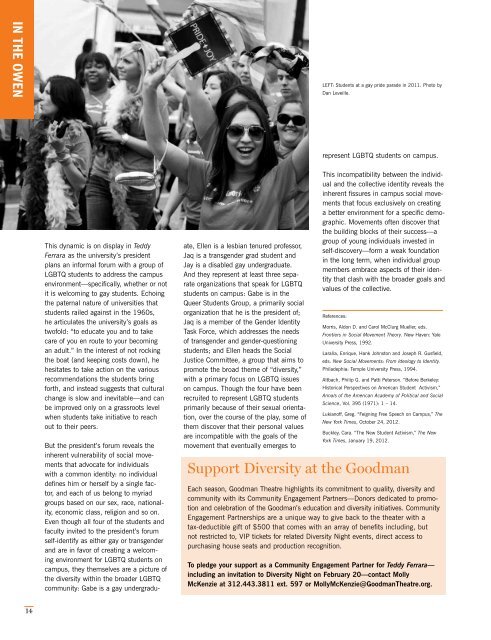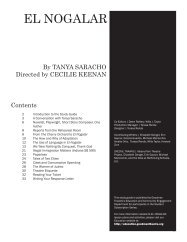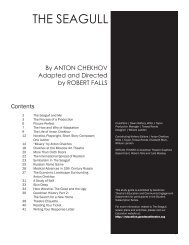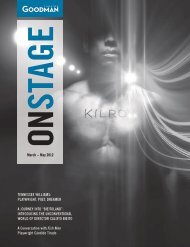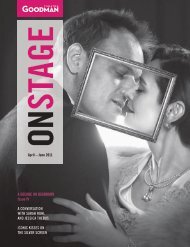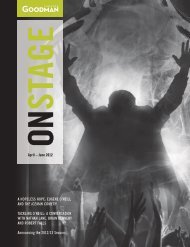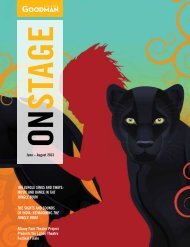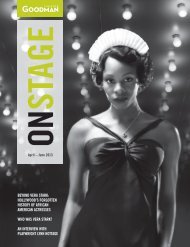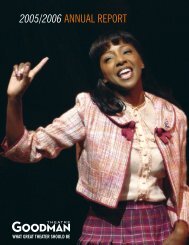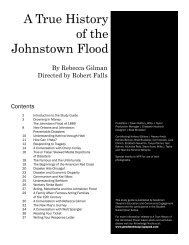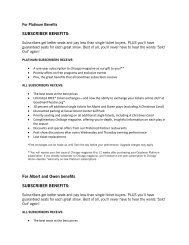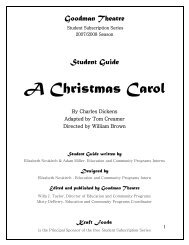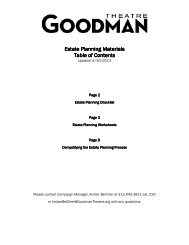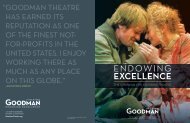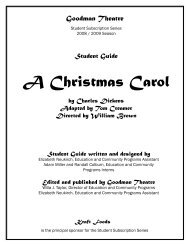You also want an ePaper? Increase the reach of your titles
YUMPU automatically turns print PDFs into web optimized ePapers that Google loves.
IN THE OWEN<br />
LEFT: Students at a gay pride parade in 2011. Photo by<br />
Dan Leveille.<br />
represent LGBTQ students on campus.<br />
This dynamic is on display in Teddy<br />
Ferrara as the university’s president<br />
plans an informal forum with a group of<br />
LGBTQ students to address the campus<br />
environment—specifically, whether or not<br />
it is welcoming to gay students. Echoing<br />
the paternal nature of universities that<br />
students railed against in the 1960s,<br />
he articulates the university’s goals as<br />
twofold: “to educate you and to take<br />
care of you en route to your becoming<br />
an adult.” In the interest of not rocking<br />
the boat (and keeping costs down), he<br />
hesitates to take action on the various<br />
recommendations the students bring<br />
forth, and instead suggests that cultural<br />
change is slow and inevitable—and can<br />
be improved only on a grassroots level<br />
when students take initiative to reach<br />
out to their peers.<br />
But the president’s forum reveals the<br />
inherent vulnerability of social movements<br />
that advocate for individuals<br />
with a common identity: no individual<br />
defines him or herself by a single factor,<br />
and each of us belong to myriad<br />
groups based on our sex, race, nationality,<br />
economic class, religion and so on.<br />
Even though all four of the students and<br />
faculty invited to the president’s forum<br />
self-identify as either gay or transgender<br />
and are in favor of creating a welcoming<br />
environment for LGBTQ students on<br />
campus, they themselves are a picture of<br />
the diversity within the broader LGBTQ<br />
community: Gabe is a gay undergraduate,<br />
Ellen is a lesbian tenured professor,<br />
Jaq is a transgender grad student and<br />
Jay is a disabled gay undergraduate.<br />
And they represent at least three separate<br />
organizations that speak for LGBTQ<br />
students on campus: Gabe is in the<br />
Queer Students Group, a primarily social<br />
organization that he is the president of;<br />
Jaq is a member of the Gender Identity<br />
Task Force, which addresses the needs<br />
of transgender and gender-questioning<br />
students; and Ellen heads the Social<br />
Justice Committee, a group that aims to<br />
promote the broad theme of “diversity,”<br />
with a primary focus on LGBTQ issues<br />
on campus. Though the four have been<br />
recruited to represent LGBTQ students<br />
primarily because of their sexual orientation,<br />
over the course of the play, some of<br />
them discover that their personal values<br />
are incompatible with the goals of the<br />
movement that eventually emerges to<br />
This incompatibility between the individual<br />
and the collective identity reveals the<br />
inherent fissures in campus social movements<br />
that focus exclusively on creating<br />
a better environment for a specific demographic.<br />
Movements often discover that<br />
the building blocks of their success—a<br />
group of young individuals invested in<br />
self-discovery—form a weak foundation<br />
in the long term, when individual group<br />
members embrace aspects of their identity<br />
that clash with the broader goals and<br />
values of the collective.<br />
References:<br />
Morris, Aldon D. and Carol McClurg Mueller, eds.<br />
Frontiers in Social Movement Theory. New Haven: Yale<br />
University Press, 1992.<br />
Laraña, Enrique, Hank Johnston and Joseph R. Gusfield,<br />
eds. New Social Movements: From Ideology to Identity.<br />
Philadephia: Temple University Press, 1994.<br />
Altbach, Philip G. and Patti Peterson. “Before Berkeley:<br />
Historical Perspectives on American Student Activism,”<br />
Annals of the American Academy of Political and Social<br />
Science, Vol. 395 (1971): 1 – 14.<br />
Lukianoff, Greg. “Feigning Free Speech on Campus,” The<br />
New York Times, October 24, 2012.<br />
Buckley, Cara. “The New Student Activism,” The New<br />
York Times, January 19, 2012.<br />
Support Diversity at the <strong>Goodman</strong><br />
Each season, <strong>Goodman</strong> <strong>Theatre</strong> highlights its commitment to quality, diversity and<br />
community with its Community Engagement Partners—Donors dedicated to promotion<br />
and celebration of the <strong>Goodman</strong>’s education and diversity initiatives. Community<br />
Engagement Partnerships are a unique way to give back to the theater with a<br />
tax-deductible gift of $500 that comes with an array of benefits including, but<br />
not restricted to, VIP tickets for related Diversity Night events, direct access to<br />
purchasing house seats and production recognition.<br />
To pledge your support as a Community Engagement Partner for Teddy Ferrara—<br />
including an invitation to Diversity Night on February 20—contact Molly<br />
McKenzie at 312.443.3811 ext. 597 or MollyMcKenzie@<strong>Goodman</strong><strong>Theatre</strong>.org.<br />
14


